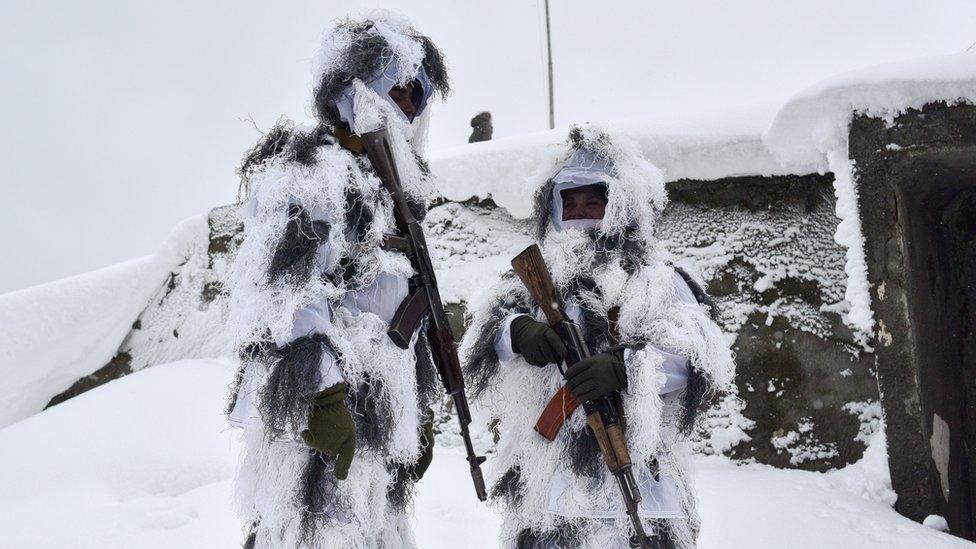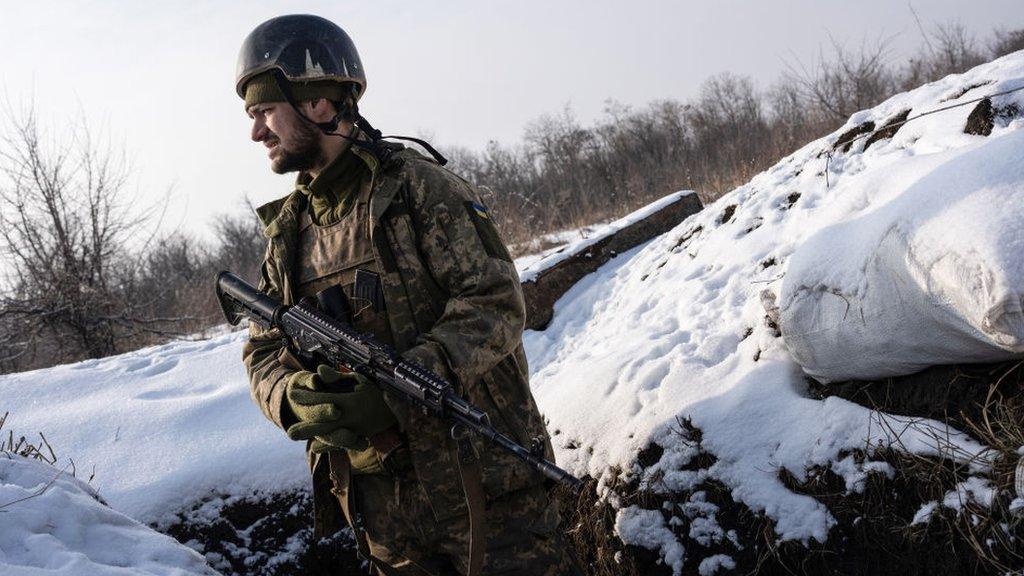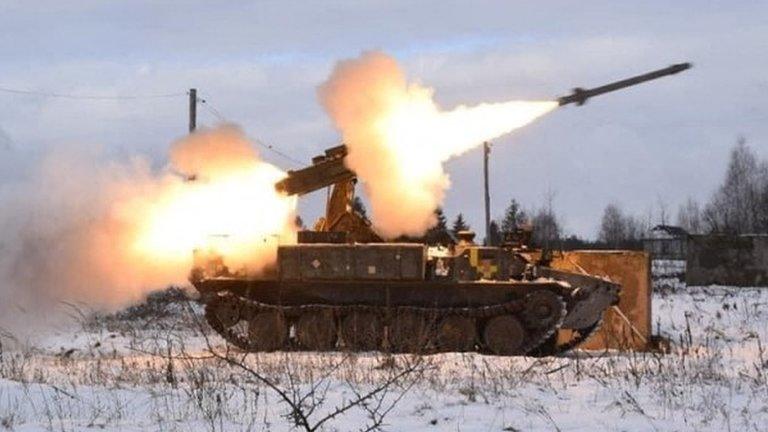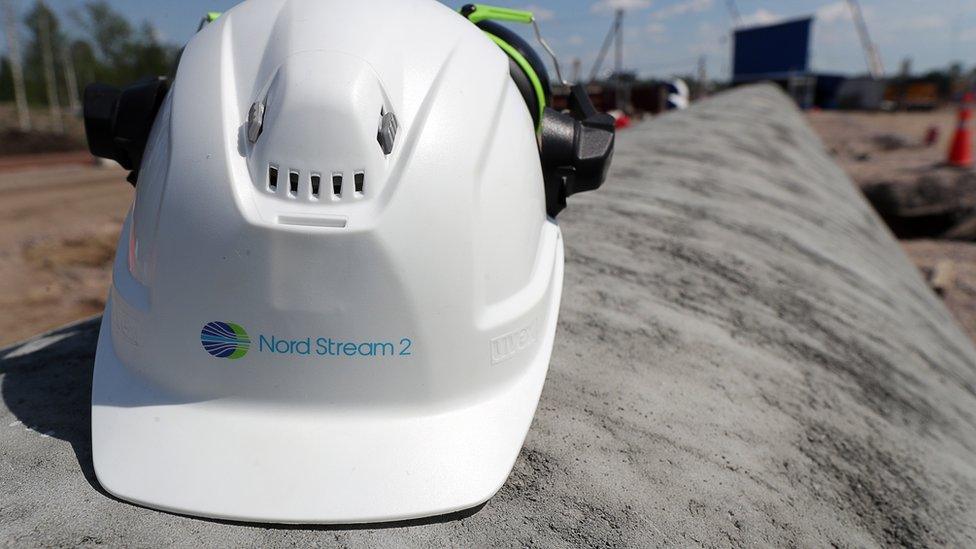Ukraine crisis: US ignored Russia's security concerns, Putin says
- Published

Ukrainian troops at a base in the west of the country - the US has warned Russia may invade next month
President Vladimir Putin has told his French counterpart that the West has ignored Russia's security concerns, amid fears Russia could invade Ukraine.
The US rejected a key Moscow demand that Nato rule out Ukraine joining the defence alliance - but insisted it was offering Russia a "diplomatic path".
President Biden says Russia could invade next month. German intelligence says Russia is prepared to attack but has not yet decided to do so.
Russia denies it is planning an attack.
But on Friday Mr Putin told French President Emmanuel Macron the stand-off had not been resolved.
"US and Nato responses did not take account of such key Russian concerns as preventing Nato expansion, non-deployment of strike weapons systems near Russian borders, or returning the alliance's military potential and infrastructure in Europe to positions existing in 1997," a Kremlin readout of the call said.
It is Mr Putin's first comment on the crisis after the US rejected Russia's main demand. He told Mr Macron he would study the US counter-proposals closely before deciding on any further action.
France said the two leaders had agreed on the need to de-escalate and Mr Macron had told Mr Putin that Russia must respect the sovereignty of its neighbouring states.
Also on Friday Ukrainian President Volodymyr Zelensky appeared to downplay Mr Biden's warning of a February invasion.
He told reporters that tensions were not currently escalating, saying: "We don't need panic."
Mr Zelensky said Ukraine should not be the subject of a deal between Mr Biden and Mr Putin and should instead be involved in talks.
And he said moves by the UK and US to pull some embassy staff and their relatives out of Ukraine had been a mistake.
Meanwhile the head of Germany's foreign intelligence service said Russia was prepared to attack Ukraine, but had not yet decided whether to do so.
"I believe that the decision to attack has not yet been made," Bruno Kahl told Reuters news agency.
And Nato Secretary-General Jens Stoltenberg said the alliance was ready to increase its presence in eastern Europe to demonstrate its resolve.
Mr Stoltenberg said Russia was deploying thousands of combat-ready troops and missile systems into Belarus, which also borders Ukraine.
Russia last month made wide-ranging security demands from the West, including that:
Ukraine should be barred from joining Nato
Nato should end military activity in eastern Europe, pulling troops out of Poland and the Baltic republics of Estonia, Latvia and Lithuania
The alliance should not deploy missiles in countries near or bordering Russia
The US and Nato responded by saying Ukraine had the right to choose its own allies but offered Russia talks on missile placements and other issues.

Why the fixation on Nato?

In public, Russian officials insist that Nato is a danger to Russia's national security.
I'm sceptical. I find it hard to believe that Moscow truly sees the alliance is a threat.
Only 6% of Russia's borders touch Nato countries; the Kremlin has good relations with some Nato members, like Italy and Hungary; it's even sold weapons systems to Nato member Turkey.
Plus, there is no sign whatsoever of Ukraine, Georgia or other former Soviet states being accepted into Nato in the near future.
So why is the Kremlin fixating on the alliance? Partly for domestic reasons: to get the Russian people to unite against an alleged external enemy.
But also, perhaps, as an excuse to use this moment to reshape the European security order to Moscow's benefit; to re-establish Russia's sphere of influence and try to rewrite the results of the Cold War.

If Russia were to invade Ukraine, it would not be the first time.
Russia annexed Ukraine's southern Crimea peninsula in 2014. It is also backing rebels who seized large swathes of the eastern Donbas region soon afterwards, and some 14,000 people have died in fighting there.
Watch the BBC's Sarah Rainsford as she tries to track down official bomb shelters in Kyiv
On Thursday the US and Germany threatened to halt the opening of a key pipeline if Russia invades Ukraine.
Nord Stream 2 would run under the Baltic Sea and is designed to double Russia's gas exports to Germany. The 1,225km (760-mile) pipeline took five years to build and cost $11bn (£8bn).
But as yet it has not started operating, as regulators said in November it does not comply with German law and suspended its approval.
Related topics
- Published28 January 2022

- Published27 January 2022

- Published16 November 2021

- Published10 September 2021
